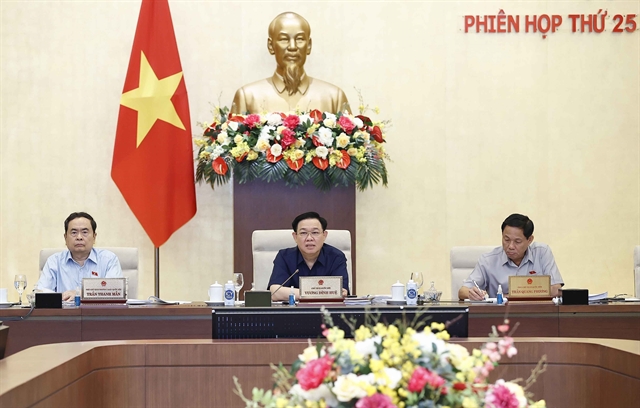 Politics & Law
Politics & Law

 |
| National Assembly Chairman Vương Đình Huệ (centre) at the 25th session of the NA Standing Committee on Friday morning in Hà Nội. — VNA/VNS Photo Doãn Tấn |
HÀ NỘI — The proposed changes to the Land Law are deemed to take significant strides, addressing numerous critical flaws associated with land.
Chairman of the National Assembly (NA) Vương Đình Huệ made this evaluation during his closing remarks at the 25th meeting of the NA Standing Committee on Friday morning in Hà Nội.
The meeting was convened to gather feedback from the committee concerning the clarification, acceptance, and amendment of the proposed changes to the land law.
Huệ highlighted that there were several concerns brought up during the drafting of the law.
He emphasised the need for collaboration between the Government, the Ministry of Natural Resources and Environment, and other pertinent bodies to address these concerns before presenting it to the NA for review and ratification.
Furthermore, he mentioned the importance of distinguishing between the withdrawal and auction of land use rights for purposes such as commercial housing projects, commercial establishments, amusement parks, entertainment zones, and multi-functional complexes in support of the nation’s socio-economic growth.
Failure to differentiate the two notions could result in ambiguities within the draft law, Vương Đình Huệ remarked.
He further highlighted the draft law's necessity to detail criteria and guiding principles for empowering localities to oversee the bidding and auction of land use rights.
Huệ directed pertinent agencies to devise policies to categorise projects aimed at constructing commercial properties with rights to lease or transfer, social housing available for rental or rent-to-buy, and reasonably priced commercial homes.
In terms of the mechanism to handle situations where there is no agreement on the transfer of land use rights between the project's developer and the public, Huệ emphasised that the accord between the developer and the public to procure land for the project falls under a civil contract.
As such, he said it wasn't suitable for the State to interfere via land repossession in scenarios where consensus is elusive.
The State solely enforces supportive measures in alignment with the tenets of the Law on the Execution of Grassroots Democracy, he commented.
On the topic of the stipulations for annual land rent payments, he instructed related bodies to precisely delineate instances where a lump-sum payment is compulsory, like an investment project where the product remains tied to the land use rights.
Further, he called for enhanced clarity on methodologies for land valuation, the list of land prices, management approaches, and the utilisation of specific land categories for education, health, sport, national defence, and security.
Moreover, Huệ requested the relevant agencies to provide greater insight into the role and purpose of the land fund development organisation, as well as its strategy for fundraising.
More clarifications
During the same session, Lê Quang Mạnh, chairman of the NA’s Finance and Budget Committee, proposed clearer delineation of the roles and duties of the land fund development organisation. He stressed the need for ensuring its competency in reclaiming and cultivating the land fund to facilitate major projects in various localities.
On the topic of land valuation, he recommended that the agency responsible for drafting the law should elucidate the principles and objectives of current or future land use. This would form the foundation for accurate land valuation, safeguarding the interests of citizens, businesses, and the State. He also underscored the importance of bolstering data collection about the land market.
Lê Thị Nga, chairwoman of the NA’s Judiciary Committee, voiced her support for comprehensive regulations concerning land procurement projects that bolster the nation’s socio-economic advancement. Nevertheless, she pointed out that if an agreement on the transfer of land use rights between the project’s developer and the public does not garner unanimous consensus, the State should refrain from reclaiming the residual land.
Highlighting the civil nature of such agreements, she argued that disputes should be resolved in a civil manner.
Moreover, Nga urged the draft law’s drafting body to specify the categories and nature of land reclamation projects that cater to national defence and security and socio-economic growth, ensuring the process is conducted transparently and in the public interest.
Hoàng Thanh Tùng, chairman of the NA’s Legal Committee, remarked that the draft amendment to the land law is perceived to be an expansive legislative proposal with profound societal implications.
Given this, the agencies involved in drafting and assessing the law had undertaken meticulous scrutiny of all legal matters, he noted.
The legal committee relayed four reports to the NA’s Economic Committee. Tùng emphasised that they have advised the economic committee to expediently address certain concerns, with a view to presenting the draft law to the NA for evaluation and ratification during its sixth session in October.
Furthermore, Tùng recommended the agencies responsible for drafting and appraising the amended law to consistently oversee its coherence with other prevailing statutes, ensuring prompt alignment. He cited examples like the amended Housing Law, the revised Investment Law, and the updated Law on Real Estate Business.
Representing the Government, Deputy Prime Minister Trần Hồng Hà acknowledged the observations made by the NA Standing Committee and representatives from pertinent ministries and departments concerning the draft amendment to the land law.
He assured that the Government will meticulously finalise the draft amendment to the land law prior to its submission to the NA for deliberation and endorsement in its upcoming sixth session. — VNS




